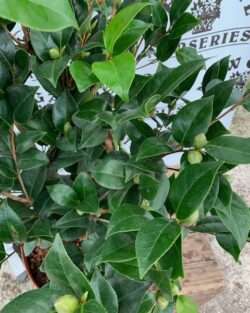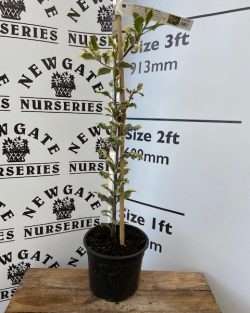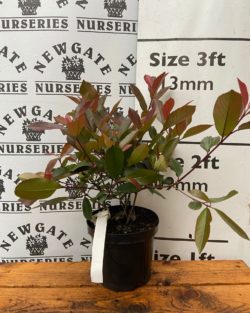Taxus Baccata Pyramid 120cm
£99.99
Plant Fact File:
- Plant Type: Evergreen Tree
- Common Name: English Yew
- Botanical Name: Taxus baccata
- Variety: Pyramid
- Height: 120cm (4 feet)
- Spread: Variable, depending on pruning
- Growth Habit: Upright, Pyramidal
- Foliage: Dark Green, Needle-Like Leaves
- Flowering: Inconspicuous, Dioecious (separate male and female plants)
- Fruit: Red Berries on Female Plants, Toxic if Ingested
- Hardiness: Fully Hardy
- Aspect: Full Sun to Full Shade
- Soil Type: Moist, Well-Draining, Acidic to Alkaline
- Uses: Specimen Plant, Formal Hedge, Topiary
Description:
Taxus baccata ‘Pyramid’ is a cultivar of the English Yew known for its upright, pyramidal growth habit. This evergreen tree typically grows to a height of around 120cm (4 feet), forming a neat and compact pyramid-shaped crown. ‘Pyramid’ is valued for its dense foliage, dark green needle-like leaves, and versatility in the landscape.
Key Features:
- Upright Growth Habit: ‘Pyramid’ is characterized by its upright and pyramidal growth habit, with a narrow and compact crown that tapers towards the top. This makes it an excellent choice for formal hedges, specimen planting, or as an accent in the garden.
- Dark Green Foliage: Like other varieties of Taxus baccata, ‘Pyramid’ features dense clusters of dark green, needle-like leaves that provide year-round interest and texture to the landscape. The foliage retains its color throughout the year, adding to the plant’s ornamental value.
- Low Maintenance: English Yew ‘Pyramid’ is a low-maintenance plant that requires minimal care once established. It is tolerant of a wide range of soil types and growing conditions, including drought, shade, and urban pollution, making it suitable for various garden settings.
- Versatile Uses: Due to its compact size and formal growth habit, ‘Pyramid’ is well-suited for use as a specimen plant in the garden, where it can serve as a focal point or anchor for mixed borders. It can also be planted in rows to create formal hedges or used for topiary, shaping into cones, spirals, or other ornamental designs.
- Attractive Berries: Female plants of Taxus baccata ‘Pyramid’ produce small, fleshy red berries in autumn, adding seasonal interest to the plant. While these berries are attractive to wildlife, they are toxic if ingested and should be kept out of reach of children and pets.
Out of stock




























